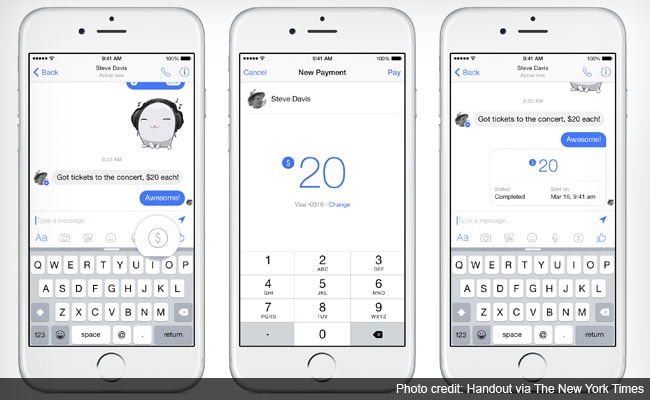 San Francisco:
San Francisco:
Facebook's instant messaging service isn't just for sending smiley
faces and photos anymore. Now you can use it to send money instantly to
your friends.
Facebook, the social networking company, announced Tuesday that U.S.
users of its Messenger app would be able to link their debit cards to
the service and use it to message money to one another just as easily as
they send a snapshot or text.
Given Facebook's huge size and reach, the introduction of its payments
feature - which has been highly anticipated by Wall Street - is likely
to cause tremors in the nascent market for instantly sending money to
individuals, known as peer-to-peer payments.
And
analysts said that if the payment system succeeded, Facebook would
extend it to other types of purchases, such as consumers' buying of
products directly from advertisers.
"Facebook could use this as a back door to get people's debit cards to
enable the buy button," said Robert Peck, an Internet analyst with
SunTrust Robinson Humphrey.
WeChat, which is essentially the Facebook of China, and other
Asia-based communications services like Alipay already allow their
hundreds of millions of users to send money via instant message. But the
technology is only beginning to appear in the United States, where
email payment services like PayPal have long been more popular.
As messaging has begun to eclipse email as the preferred form of
electronic communication, especially among younger users, Facebook has
sought to dominate that market much as it dominates social networking.
The company's Messenger app is one of the largest platforms in the
world, with more than 500 million monthly users. And last year, Facebook
spent nearly $22 billion to buy WhatsApp, a separate messaging platform
that now counts more than 700 million active users globally.
In the United States, a host of peer-to-peer money transfer services
have emerged and are trying to capture the wallets of messaging
enthusiasts.
Venmo, a mobile payments app owned by eBay's PayPal unit, is perhaps
the most direct competitor to Facebook's new offering. Popular with
young users, it is not just a payment system but a social network that
allows users to post public or private messages about what the money is
for.
Square, the e-commerce startup, offers a similar app that allows
payments to individuals by email. And Snapchat, the startup known for
its disappearing messages, also allows users to send cash to one another
through a partnership with Square.
With its service, Facebook wanted to simplify the process as much as
possible, according to Steve Davis, the product manager in charge of the
project.
"We know that conversations about money are happening all the time," he
said in an interview. "But most conversations begin in one place and
end in another place."
Facebook wanted to keep the payment and the conversation in one message
thread that would also serve as a record. So right next to the
thumbs-up button on the Messenger screen will be a dollar-sign icon to
send money. If a debit card number is already saved in the app, you can
send money to the other person in the conversation by clicking the
dollar sign and entering an amount. The whole conversation will be saved
for later reference.
To reduce the risk of unauthorized transactions, Facebook said, users
must enter a PIN or use Apple's fingerprint identification system before
they can send the money.By using debit cards to handle the transfer,
the money can move fairly quickly between the two bank accounts while
allowing Facebook to offer the service free to users. Unlike PayPal or
Venmo, "you don't have to remember to withdraw the funds later," Davis
said.
As with most new Facebook features, the Messenger payments button will
be gradually introduced to U.S. Messenger users over the next few months
and will be available on mobile apps as well as the web version.
Initially the service will be limited to sending money between people
who are Facebook friends, so it will not immediately compete with Apple
Pay and other mobile payment services meant to allow people to make
purchases easily with their phones. The commercial market, Davis said,
poses a different set of challenges.
Still, some merchants, particularly overseas, have been informally using Messenger to make transactions, Facebook said.
The company has a payments business that brought in nearly $1 billion
last year, mostly for items purchased within games hosted on its
platform. It has also been experimenting with an e-commerce system that
allows merchants to list items for sale and collect money for purchases
directly on the social network.
Wall Street has been hotly anticipating the addition of payments to
Messenger since June, when Facebook hired the president of PayPal, David
Marcus, to lead its messaging efforts.
Mark Zuckerberg, Facebook's chief executive, told analysts in January
that he expected Messenger and WhatsApp to be big moneymakers
eventually.
"I'm a big fundamental believer that these are going to be very big
contributors to our businesses over time, but we just have to do it
right," he said.







